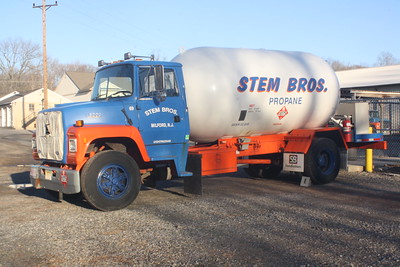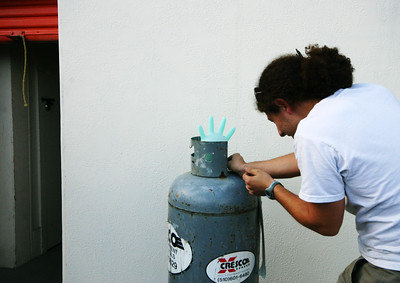
Propane is a gas and chemical that is used for many purposes, including grilling and heating. It is also a common fuel for many vehicles. Propane has a very distinct scent that many people find unpleasant. The reason propane smells so bad is because it contains a compound called Ethyl Mercaptan. This compound is also responsible for the smell of skunks or rotten eggs.
In its natural state, propane is an odorless gas, just like natural gas. To easily determine a leak, mercaptan is added to the gas to smell it obnoxious. Without adding this compound, handling and using propane can be extremely dangerous because there is no way to know that there is a leak that could cause an explosion.
Why Your Propane Smells on Purpose
Imagine a gas so sneaky, you wouldn’t know it was there until it was too late. That was the reality until a devastating school explosion in 1937, caused by an undetectable propane leak, led to a big change. To make sure you could notice trouble, literally, a stinky substance was added to propane. This way, if there’s a leak, your nose is your first warning sign.
Propane doesn’t actually have its own odor. So, when you think you’re noticing propane, you’re actually smelling ethyl mercaptan—a chemical that is like rotten eggs or skunk spray. It’s added to propane to grab your attention even if there’s just a tiny leak. Other smelly additives are used too, but ethyl mercaptan is the most famous for making sure you can’t miss it.
The stink added to propane is all about keeping you safe. It’s like having a built-in alarm that goes off when propane starts to escape. If you catch a whiff of that foul odor, it’s time to act fast—get out of the area and shut off the gas if it’s safe to do so. This safeguard means that even if you’re not a super-sniffer, you’ll likely still catch the scent of danger before it’s too late.
Read related article: Why Do I Smell Propane When There is None? (Possible Causes)
What Does Propane Gas Smell Like?
Propane gas has no odor in its natural state. To make it detectable, a chemical compound called mercaptan is added to propane gas as an additive. Mercaptan has a strong, pungent odor that is similar to rotten eggs or sewage.
Mercaptan is a sulfurous compound that has a strong, pungent odor that is similar to rotten eggs or sewage. The addition of mercaptan to propane gas allows for easy detection of gas leaks, which is essential for ensuring the safety of those using propane.
The use of mercaptan as a propane smell additive has been standard practice in the industry for many years. In fact, it is required by law in most countries to add mercaptan to propane gas for safety reasons. This odorant helps to prevent accidents and injuries by alerting people to the presence of gas leaks.
While the strong odor of mercaptan may be unpleasant to some, it is an important safety feature of propane gas. Without the addition of mercaptan, propane gas leaks could go undetected, leading to potential fires, explosions, and other hazards. In addition to its use as a propane smell additive, mercaptan is also used in a variety of other applications, such as the production of certain chemicals and pesticides, as well as in the manufacture of rubber and plastics.
Overall, the strong odor of mercaptan may be off-putting to some, but it serves an important purpose in ensuring the safe use of propane gas. Without the addition of this smell additive, propane gas leaks could go undetected, posing a serious risk to those who use it.
Additive to make propane gas smell bad
Propane is a commonly used fuel for a variety of applications, including heating, cooking, and generating electricity. It is a clean-burning, efficient fuel that is often preferred over other fossil fuels due to its low emissions and cost-effectiveness. However, propane has one major drawback: it is a colorless and odorless gas, making it difficult to detect if there is a leak.
To address this issue, an additive called mercaptan is added to propane gas. Mercaptan is a chemical compound that has a strong, pungent odor that is similar to rotten eggs or sewage. The addition of mercaptan to propane gas allows for easy detection of gas leaks, which is essential for ensuring the safety of those using propane.
The use of mercaptan as a propane smell additive has been standard practice in the industry for many years. In fact, it is required by law in most countries to add mercaptan to propane gas for safety reasons. This odorant helps to prevent accidents and injuries by alerting people to the presence of gas leaks.
While the strong odor of mercaptan may be unpleasant to some, it is an important safety feature of propane gas. Without the addition of mercaptan, propane gas leaks could go undetected, leading to potential fires, explosions, and other hazards.
In addition to its use as a propane additive, mercaptan is also used in a variety of other applications. It is commonly added to natural gas, which is odorless in its natural state, to provide a warning of gas leaks. Mercaptan is also used in the production of certain chemicals and pesticides, as well as in the manufacture of rubber and plastics.
Overall, the strong odor of mercaptan may be off-putting to some, but it serves an important purpose in ensuring the safe use of propane gas. Without the addition of this smell additive, propane gas leaks could go undetected, posing a serious risk to those who use it.
Read related article: Should You Smell Propane from Your Fireplace? (What to Check)
Understanding the Odorant
A. What Mercaptans Are Made Of
Think of mercaptans as tiny, stinky molecules that are really good at letting you know they’re there. They’ve got this special part that’s made of sulfur, which is like a flag that waves around saying, “Hey, smell me!” That’s why they’re mixed into propane—so you can notice it if it starts to leak.
B. Mercaptans vs. Other Sulfur Stuff
Now, there are lots of things with sulfur in them, but mercaptans are the super foul ones. They’re like the skunk of the sulfur world. If sulfur smells were a loudness contest, mercaptans would be shouting through a megaphone. That’s why they’re used instead of other sulfur smells—you’ll notice them right away if they’re in the air.
C. The Secret Behind the Stench
Why do mercaptans stink so much? It’s because they fit perfectly into the scent detectors in your nose. When mercaptans sneak into the air, they find their way up your nostrils and set off alarms in your brain, making you think, “Yuck! What’s that odor?” This is super useful because if you ever notice that stinky scent, it’s like a warning sign that you need to check for a propane leak.
The Alarm Bell in Your Nose
When propane gets its signature stinky smell from mercaptans, it’s all thanks to your nose’s superpowers. Inside your nose, there are tons of tiny sensors just waiting to pick up different odors. The moment you get a whiff of that added stink in propane, these sensors send a message straight to your brain, and you instantly know—something’s up.
Your amazing sniffing ability isn’t just random; it’s by design. Over thousands of years, humans have gotten really good at noticing smells that could signal danger, like the rotten egg stink of mercaptans. This stink sets off alarm bells in your body, telling you to watch out and stay safe. It’s nature’s way of giving you a heads-up.
That strong scent from mercaptans isn’t just a physical thing; it’s got a whole lot of psychological and even cultural stuff tied to it. For many people, that rotten egg odor can cause a gut reaction—you might feel disgusted or even get a little panicky. That’s your brain’s way of telling you to avoid the danger. Plus, in many cultures, that smell is a clear sign of something bad, which means from a young age, you’re taught to be on alert when you notice it. It’s all about keeping you away from harm’s way.
Read related article: Should You Smell Propane When Your Oven is On (What to Do)
Enhancing Your Safety
A. Technological Advancements in Odor Detection
You now have access to more advanced technologies that can detect propane far earlier than your nose might notice it. This is crucial, especially considering that the sulfur-like smell added to propane can become familiar and less noticeable over time.
- Electronic Gas Detectors: Equip your home with these detectors to catch leaks you might miss. They’re always on guard, providing an extra layer of protection.
- Smart Home Detectors: Upgrade to smart detectors that send alerts straight to your phone or a central monitoring system the moment they sense propane in the air.
- Industrial Safety Systems: If you work around large quantities of propane, you’ll be glad to know that industrial-grade detection systems are increasingly standard. These often include automatic shut-off mechanisms that kick in at the first sign of a leak.
B. The Importance of Regular Maintenance and Leak Checks
To safeguard your environment, it’s essential to stay on top of maintenance and perform routine leak checks:
- Professional Inspections: Schedule regular professional inspections. Experts can spot issues that aren’t obvious, helping to prevent leaks before they start.
- DIY Leak Checks: Learn how to perform simple leak checks yourself. A quick test with soapy water over connections can reveal leaks by the appearance of bubbles.
Read related article: Why Does Propane Smell When the Tank is Low?
What to do if you smell propane gas
If you smell propane gas, it is important to take immediate action to avoid potential fires or explosions. Here are some steps to follow if you detect the odor of propane gas:
- Leave the area immediately. Do not delay in evacuating the space where you detect the propane gas odor.
- Do not turn on any lights or appliances, and avoid using open flames or creating sparks. These actions could ignite the gas and cause an explosion.
- Close the gas supply valve if it is safe to do so. If you can reach the gas supply valve without coming into contact with the gas, turn it off to stop the flow of gas.
- Call the gas company or emergency services immediately. Inform them that you have detected the odor of propane gas and provide them with your location.
- Wait outside until emergency personnel arrive. Do not return to the area until it has been declared safe by the gas company or emergency responders.
- Have the gas system inspected and repaired by a qualified technician. After the gas leak has been contained and the area has been declared safe, it is important to have a professional inspect and repair the gas system to prevent future leaks.
- Install a propane gas detector. In addition to having your gas system inspected and repaired, it is also a good idea to install a propane gas detector in your home or building. This device can alert you to the presence of propane gas, allowing you to take action before a leak becomes dangerous.
By following these steps, you can help to prevent fires and explosions caused by propane gas leaks. It is important to act quickly and carefully if you detect the odor of propane gas to ensure the safety of yourself and others.
New scents are under development in the laboratories
A variety of new propane additives are currently being tested in laboratories to determine if the stinky smell of mercaptan can be replaced by other unique but more pleasant aromas. This research is being conducted in response to concerns about the strong, pungent odor of mercaptan, which many people find unpleasant.
Propane is a clean-burning, efficient fuel that is used for a variety of applications, including heating, cooking, and generating electricity. However, propane is a colorless and odorless gas, making it difficult to detect if there is a leak. To address this issue, mercaptan is added to propane gas as an additive. This chemical compound has a strong, pungent odor that is similar to rotten eggs or sewage, and it allows for easy detection of gas leaks.
While the use of mercaptan as a propane additive is standard practice in the industry and is required by law in many countries, some people find the odor to be unpleasant and offensive. This has led to a search for alternative additives that could provide the same safety benefits as mercaptan without the unpleasant odor.
One of the main challenges in developing a new propane odor additive is ensuring that it is easily recognizable and can be distinguished from other common household odors. The new additive must also be able to withstand the high temperatures and pressures of the propane gas system.
If successful, the development of a new additive could provide an alternative to mercaptan that is more pleasant to the sense of smell. This could improve the overall experience of using propane gas and make it more appealing to consumers. However, it is important to carefully evaluate the effectiveness and safety of any new propane additives before they are introduced into the market.
To Make a Conclusion
the unmistakable stench that’s been so cleverly tied to propane is not just a matter of chemical ingenuity, but a testament to our survival instincts.
The mercaptans that give propane its foul odor play a vital role in ensuring your safety, tapping into deep-seated biological and psychological responses to protect you from the invisible dangers of this otherwise odorless gas.
Whether it’s the immediate wrinkle of your nose or the innate desire to escape the source, this engineered odor serves as a silent guardian. It’s a simple yet profound reminder of how our senses are intricately linked to the world around us and are key to our well-being.
So the next time you catch that unpleasant sulfur scent, remember—it’s a small inconvenience for a potentially life-saving warning.

Mike is an experienced propane technician with over 15 years of professional experience in the field. He has dedicated his career to helping customers with their propane needs, from installation to maintenance and repair. Together with Jeremy, he co-founded this website to provide useful information and guidance to customers seeking reliable propane services.



